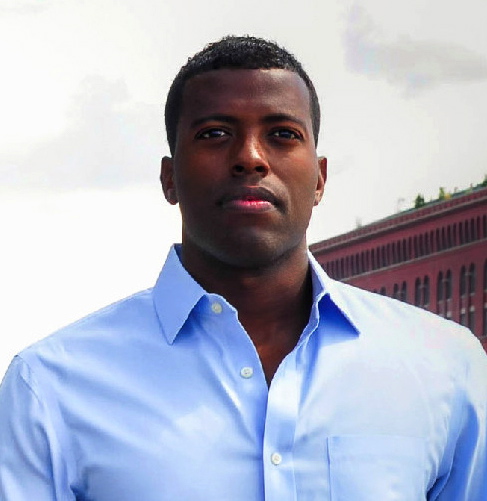
The Fighter

by Jed Ocot
Rob Smith’s memoir Closets, Combat and Coming Out is not only the first gay Iraq war memoir to be published after the repeal of “Don’t Ask, Don’t Tell,” but it’s also the first by an African-American. The five-year Iraq war veteran reveals how he struggled with the torment he received from others for his homosexuality—feeling alone and, at one point, suicidal.
As an infantry soldier in Iraq, he felt “puzzled by a murky and unfocused sense of unfairness. Why should any of us have to die, and what exactly is it we would be dying for? Even with all the articles, news stories, and briefings from our company commanders, I still found myself with unanswered questions.”
Smith found himself signing up for the Army simply because he had “slipped through the cracks.” His parents couldn’t afford to send him to college. A 4.0 honor-roll student at a school where athletics reigned over academics, Smith had hopes that he would become a broadcaster since he anchored the newscasts. Even his guidance counselors didn’t know where to place the “fat kid who hadn’t played a sport in his life.” This decision to go into the Army made Smith nervous, but he felt it was necessary. “Perhaps this was my time, to be all I could be,” he says in his memoir.
Upon meeting his recruiter, Corporal Kevin Garvin, Smith describes him as an “Adonis.” It was a new feeling for the then seventeen-year-old, and he was smitten. Garvin felt that Smith was best suited to be an infantry soldier. Smith felt a connection to Garvin, and the two spent a lot of time together in the weeks leading up to Smith’s entry into the Army.
 The first two minutes of Smith’s military experience was a blur. He was picked on almost immediately and later would be taunted by fellow soldiers. A sergeant called him a faggot for merely looking at him. “No, Drill Sergeant, I’m not a faggot, Drill Sergeant!” Smith yelled back. “Then stop eyeballing me like you want to f–k me!” said the drill sergeant.
The first two minutes of Smith’s military experience was a blur. He was picked on almost immediately and later would be taunted by fellow soldiers. A sergeant called him a faggot for merely looking at him. “No, Drill Sergeant, I’m not a faggot, Drill Sergeant!” Smith yelled back. “Then stop eyeballing me like you want to f–k me!” said the drill sergeant.
Smith came across a four-page story about the murder of Barry Winchell in Rolling Stone. Winchell was also an infantry soldier, who on July 6, 1999, was beaten to death by another soldier who found out he was seeing someone who was transgender. “I didn’t know whether these guys in my platoon or squad were just a few beers away from a fag witch hunt, but I certainly didn’t want to find out,” Smith writes.
One night, Smith agreed to go to a strip club with other soldiers to make sure that he was indeed gay. After an awkward lap dance in which he couldn’t get aroused, he knew for sure that he wasn’t attracted to women. Not long after this incident, Smith came out to his mother, who ended up rejecting his sexual orientation. “Robert, you know that’s not allowed in the Army,” she said. “You also know that’s not God’s plan.”
Smith’s personal struggle is a strong reminder that the battle for equality in the military is still far from over despite the repeal of “Don’t Ask, Don’t Tell.” Transgender people are prevented from serving openly. There’s a lack of a nondiscrimination policy in regards to sexual orientation. Also, those discharged under DADT were stripped of the benefits they worked hard for. Smith dedicates the book to members of the LGBT community who have had to or currently serve in silence.
Closets, Combat and Coming Out (Blue Beacon Books) is available from amazon.com.
http://www.youtube.com/watch?v=RDdkBZM-S5I










